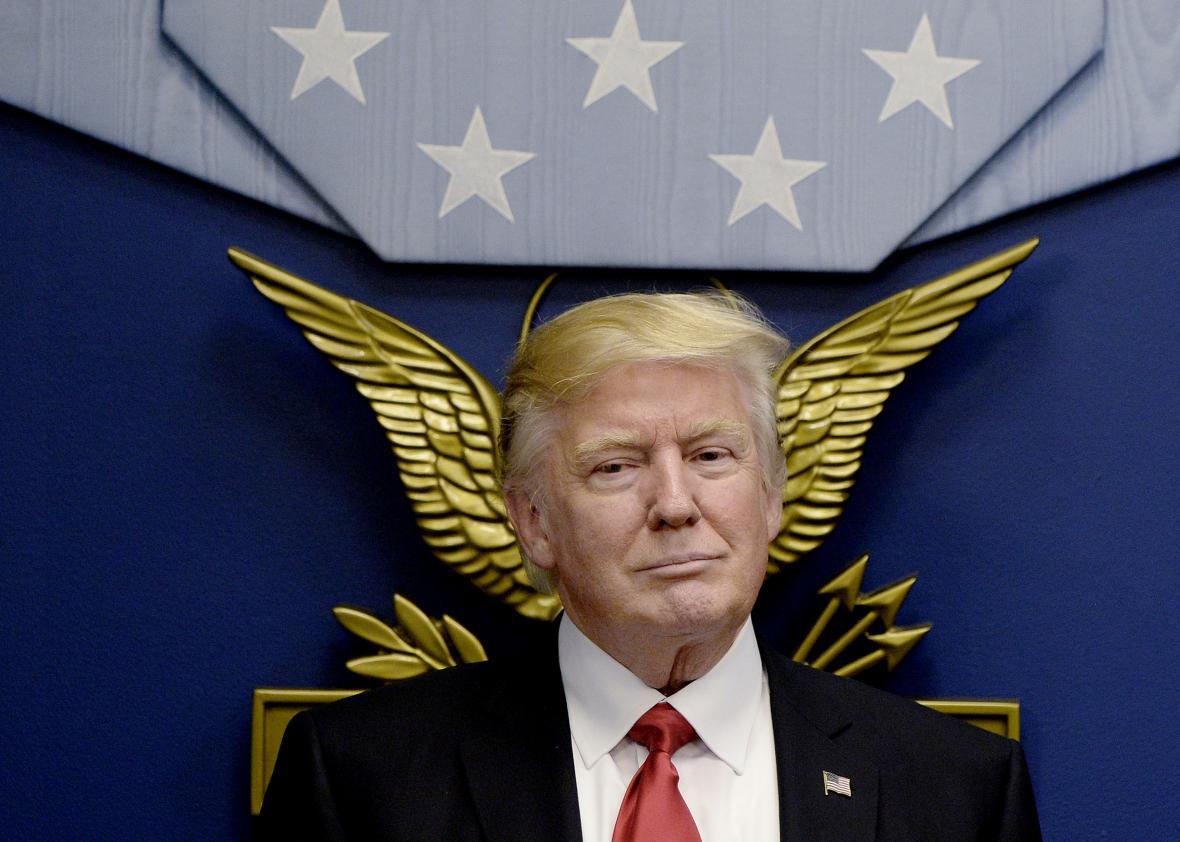On his eighth day in office, President Donald Trump signed an order purporting to keep America safe by keeping terrorists out. In reality, the order does little to keep us safe and probably does immediate harm by handing our enemies another propaganda victory. Worse, in barring all immigrants and visitors from seven countries the Trump administration associates with terrorism, it betrays our ideals and abandons the many thousands of friends in those countries who have supported us during the past 15 years of war in the Middle East. This national door-slam will echo for decades and ultimately undermine our continuing campaign in Iraq and Syria by telegraphing to any potential supporters or allies that American friendship always comes with an asterisk.
In a manipulative bit of political theater, President Trump chose to sign this order at the Pentagon, in front of his vice president and newly installed secretary of defense. The troika chose the Hall of Heroes for their venue—a room that showcases the Medal of Honor, our country’s highest award for valor in combat. That Trump chose this venue shows both his ignorance of the military (at end of fiscal year 2015, 109,321 troops had earned expedited citizenship since 9/11 through military service; more than 20 percent of Medal of Honor recipients have been immigrants) and his intent to corrupt the military in service of his political agenda. Just as Trump dishonored the CIA and its Memorial Wall by attacking the press there last week, so too did he defile the Hall of Heroes and the military with his political event on immigration.
Signing the order in such a place of military honor was a particular slap in the face to the 2.8 million veterans who have served since 9/11 in Iraq, Afghanistan, and other theaters of war. In those distant, dangerous places, we relied heavily on local leaders, allies, and interpreters. We recruited hundreds of thousands of Iraqis and Afghans to fight alongside us as soldiers, policemen, and interpreters for U.S. military units. These locals, including many I served with, paid a heavy price in blood.
One of them was a close friend who spoke often with me about wanting to come here some day. Thaer Kudaer al-Qasi lived with my team of military advisers to the Iraqi police in downtown Baquba, Iraq, in 2006. He was a Sunni Muslim who lived in the northern part of Iraq’s diverse, volatile Diyala province. Thaer was an Iraqi lawyer and polyglot who spoke five languages and knew everyone. He worked for us as our interpreter because the job paid well and he needed to provide for his wife and children. But combat forges bonds that transcend any transactional relationship. We became friends, we took risks for each other, and Thaer saved our lives many times with his information or insights or counsel.
We came home. Thaer never left. Two months after my team redeployed, I learned that Thaer was dead. We think he was kidnapped and killed by al-Qaida in Iraq because of his visible work with my team promoting the rule of law in Baquba. That was the risk faced by every Iraqi who worked with us. But we never learned what happened and never will. Iraq in 2006 was a dystopian place where life was cheap. Many thousands of Iraqi interpreters, soldiers, police, and civilians who fought with us met similar fates. Of those who survived, many spoke to us about wanting to visit the U.S. someday, or maybe even move here, to escape the carnage that surrounded them in Iraq and seemed to never end.
Enter President Trump, with a plan to make America safe again by barring immigrants of any kind from the places where we have fought for the past 15 years. His overbroad and hastily drafted order suffers from many defects, but the most pernicious is this exclusion of the very men and women we’ve depended upon to help us in Iraq and other hotspots around the Middle East.
This betrayal evokes past, similar shameful national episodes, such as the way we abandoned to their fates so many allies in Vietnam, Laos, and Cambodia. But our betrayal will likely burn us worse this time, because we have made no effort similar to the task force that resettled more than 130,000 Vietnamese refugees here, and in any case we are still fighting in Iraq and other countries named in Trump’s order. Even as we bar them and their loved ones from so much as visiting the U.S.—let alone seeking asylum here—we ask them to fight and bleed alongside us.
It’s no accident that so many of the angriest statements against Trump’s order would come from American post-9/11 veterans. We relied on these Iraqis and others to show us the way and teach us the landscape in very dangerous and alien places. That we would now turn our backs on these people is too much to bear quietly.
